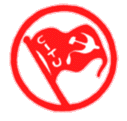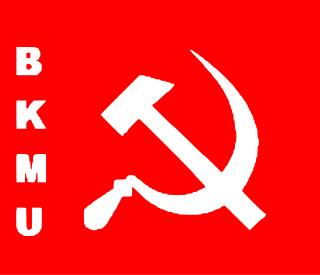
The Communist Party of India (Marxist) (abbreviated as CPI(M)) is a communist political party in India. It is the largest communist party in India in terms of membership and electoral seats, and one of the national parties of India. The party was founded through a splitting from the Communist Party of India in 1964 and it quickly became the dominant faction.
Events in the year 1991 in the Republic of India.

Marxist Communist Party of India, MCPI was a political party in India that formed in 1983 under the leadership of Mohan Punamia. It emerged as a splinter group of Communist Party of India (Marxist) stuck to the original 1964 programme. The party general secretary was Jagjit Singh Lyallpuri.

Communist Party of India (Marxist–Leninist) New Democracy is a communist political party in India. The party was founded as a breakaway from the Communist Party of India (Marxist-Leninist) in 1988. The general secretary of this party is Yatendra Kumar.
Visakha Steel Workers Union, a trade union of steel workers at Visakhapatnam Steel Plant, in Visakhapatnam, India. VSWU is affiliated with the All India Trade Union Congress.
Andhra Pradesh Anganwadi Workers and Helpers Union, a trade union of Anganwadi workers and helpers in Andhra Pradesh, India. Anganwadi workers and helpers are workers engaged by the government to work in the state operated Integrated Child Development Services which cater to the health and pre-school education needs of 0- to 6-year-old children; as also the health and nutrition needs of pregnant women, nursing mothers and adolescent girls. All 0- to 6-year-old children, all pregnant women, nursing mothers and adolescent girls in India are entitled to access to this Service. APAW&HU is affiliated to the Centre of Indian Trade Unions. The president of the union is B. Lalitamma and the secretary P. Roja.

The Centre of Indian Trade Unions (CITU) is a national level trade union in India. It has presence mostly in the Indian state of Tripura, followed by West Bengal, Kerala and Kanpur. They have also have some presence in Tamil Nadu and Andhra Pradesh.

The All India Trade Union Congress (AITUC) is the oldest trade union federation in India. It is associated with the Communist Party of India. According to provisional statistics from the Ministry of Labour, AITUC had a membership of 14.2 million in 2013. It was founded on 31 October 1920 with Lala Lajpat Rai as its first president.
The Federation of Indian Rationalist Associations (FIRA) is an umbrella body of 83 rationalist, atheist, skeptic, secularist and scientist organisations in India.

The All India Students' Federation (AISF) is the oldest student organisation in India, founded in 1936.

Bharatiya Khet Mazdoor Union which translates to 'Indian Land Workers Union' is a trade union of agricultural labourers in India. BKMU is politically tied to the Communist Party of India (CPI). BKMU is independent from both the main trade union central of CPI, the All India Trade Union Congress, as well as the farmers' organisation of CPI, the All India Kisan Sabha.
Bank Employees Federation of India (BEFI) is a bank trade union consisting of employees of commercial banks, Reserve Bank of India, NABARD, regional rural banks and co-operative banks. The federation espouses the causes concerning service conditions of bank employees, development of the banking industry, defense of public sector banking in India and exemplary service to customers, including the marginal and neglected. It is focused for the betterment of the working class and for India's economic and political independence.

The All India Carrom Federation (AICF) is India's national sport federation for the indigenous game of carrom, sanctioning six to seven national-level tournaments per year. It is India's representative body in the International Carrom Federation. The AICF has 15 regional and 28 state subnational affiliate institutions, the largest of which is the Maharashtra Carrom Association, further subdivided into local organisations.

The following outline is provided as an overview of, and topical guide to, India:
Andhra Pradesh United Teachers Federation a pro-Communist Party of India (Marxist) (CPI(M)) teachers union in Andhra Pradesh, India.It was a united state teachers federation of Andhra pradesh and Telangana till April 2014. United teachers federation is affiliated toState teachers Federation of India (STFI). UTF was established on 10 August 1974. Its main goal for formation was to unite all the Teachers of Andhra pradesh. It is presently working to mobilize teachers against the corporatisation and monetization of education and to safeguard public education together with the people.From regrouping scales, pay scales upgrades, aided teachers direct payments, retirement for age of 60s, geo-instruments, counseling, insignia, etc., UTF, an organization that has stood at the forefront of independence and unity to abolish the apprenticeship policy. UTF has a strong voice in society for the teachers, pensioners, school workers safeguard and government schools Development. It is an active union of teachers in development of society. It also elected Member of legislative Council (MLC's) from their Union.They have president and general secretary as their union leaders.
The Andhra Pradesh Vyavsaya Vruthidarula Union (APVVU) is a state level trade union federation in the state of Andhra Pradesh in India. The APVVU comprises 448 mandal (block) level trade unions of agricultural workers, marginal farmers, fisher folk, indigenous people, shepherds and rural artisans. The APVVU is part of the National Alliance of People's Movements and the Progressive International.
K. Hemalata is an Indian Marxist politician and Central Committee member of Communist Party of India (Marxist). She is the first women to lead a union at national level in the history of trade union movement in India.

In 1964, a major split occurred in the Communist Party of India. The split was the culmination of decades of tensions and factional infighting. When India became independent in 1947, differences arose of how to adapt to the new situation. As relations between the Nehru government and the Soviet Union improved, a faction that sought cooperation with the dominant Indian National Congress emerged within CPI. This tendency was led by S.A. Dange, whose role in the party hierarchy became increasingly controversial. When the Sino-Indian War broke out in 1962 Dange's opponents within CPI were jailed, but when they were released they sought to challenge his leadership. In 1964 the party was finally divided into two, with the left faction forming the Communist Party of India (Marxist). The split had a lot of regional variations. It also impacted other organizations, such as trade union and peasant movements. The split has been studied extensively by scholars, who have sought to analyze the various domestic and international factors involved.










